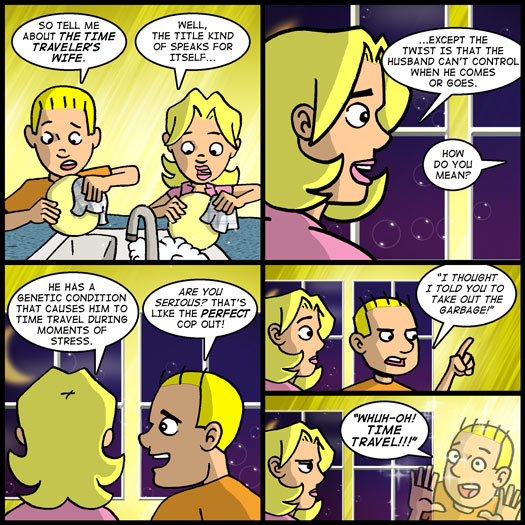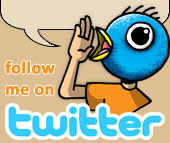The Time Traveler’s Wife comes out this weekend and come hell or high water, we’re seeing it. Cami has made this an official decree. “Call you parents and find out if they can watch Henry this weekend,” she said. “Because we’re seeing it.”
I have no problem with this mostly because I’m happy to see Cami this excited about seeing a movie. There hasn’t been much for her this summer that has caught her interest. So I think it’s great that she’s chomping at the bit to see it.
I believe Cami read The Time Traveler’s Wife for her book club (I don’t know how long ago) and loved it. I was talking to her about it last night but asked that she not spoil it for me. Still, when she explained that the time traveler in question disappears during moments of stress, I went online to learn a little bit more about it. I love that the author, Audrey Niffenegger, is using science fiction as a metaphor for unreliable men and failed relationships. It’s quite inventive.
Not much to say about today’s comic. I’m a little distracted because I have to finish an 8 to 15 page paper today about the ethics of editorial cartoons for one of my Master’s courses. I have a couple of pages written, basically outlining the history of the editorial cartoon. I’m going to move into editorial cartoons in the modern day (for example, the Danish newspaper that printed the cartoon depicting Muhammad and the controversy that caused). I hope to wrap up with something about the future of editorial cartoons in an uncertain economic climate. Several editorial cartoonists are being let go from newspapers around the country and it begs the question whether these individuals are serious journalists or mouthpiece for a newspaper’s editorial board. I’m also going to look at the internet and self-publishing as a recourse for these displaced artists.
If anyone has any thoughts or ideas about this subject that they’d like to share with me, please leave comments. I’m still looking to mix in a few good references if you have any.
Anyway, that’s all for now. Have a good day!
Well, the title kind of speaks for itself...
...except the twist is that the husband can't control when he comes or goes.
How do you mean?
He has a genetic condition that causes him to time travel during moments of stress.
Are you serious? That's like the PERFECT cop out!
"I thought I told you to take out the garbage!"
"Whuh-oh! Time Travel!"







Funny comic. I don’t really have much of an interest in Time Traveler’s Wife, but even if I had a passing interest in it, I probably wouldn’t see it this weekend because Ponyo (the new Hayao Miyazaki film) is finally getting released in North America on Friday.
By the way, it was a Danish newspaper that printed those controversial Muhammad cartoon, not Dutch, just so you know.
Whoops! Danish not Dutch. Gotcha. Corrected!
I’ve always considered editorial cartoonists to be more humorist than journalism. Granted, my journalism experience is limited to a couple of years of being an editor in high school, but I’ve always felt that there was at least a subtle distinction between the two. Journalism is based on the gathering, reporting and commenting on the facts of current (varying opinions of Fox News nonwithstanding), while humorists like editorial cartoonists are satirizing a hot topic with less concern for factual content or accuracy. Editorial cartoonist point out the absurdities of the hot button issues – really, more accurately, they point out the absurdities in the *public perception* of said issues.
So, while I can appreciate the humor found in a good editorial cartoon, would I use it in a serious conversation about politics or the economy? Absolutely not.
I think there’s validity to the above point, but I also think that very often editorial cartoonists, like many editorial writers, are using humour to highlight a truth. Of course, they do engage in hyperbole, and their work is by its very nature subjective, but more often than not it is based in fact, and can be effective in conveying a serious point in a very simple, direct and powerful way. In fact, I’ve seen several editorial cartoons that were not particularly funny, but extremely pointed and poignant.
Those are great points, Ann. Art has always been a great way to highlight truths in a multitude of manners, be it humourous or poignant, and editorial cartoons are no expection.
To me, though, art and journalism serve two different functions. Journalism should present the facts in an objective manner, free from the writer’s opinions, slants or biases. More often than not, art uses subjectivity to express the ideas, emotions, and opinions of the artist, sometimes based on fact and sometimes based entirely on fiction. It’s the difference between reading the business section of the newspaper and reading Atlas Shrugged – the paper will present with the facts of what happened in the previous day/week, while Atlas Shrugged presents Rand’s stance on what would have happened if the economy tipped to far towards one philosophy over the other.
But that’s just my opinion, and there’s a lot of grey area. Should we consider editorials as journalism when they’re essentially subjectively-written art? What about Dave Barry, or even Jon Stewart?
Champing at the bit.
Champing Champing Champing
(Sorry, pet peeve of mine)
The plate Cami’s holding kinda looks like Pac-man
Are you sure it’s “champing,” John? I typed the phrase into Google and it asked me if I meant “chomping…” ;D
I think it’s pretty telling that where you, for most newspapers, find the editorial cartoons is in the op-ed section. Surrounded by other opinion pieces submitted to the paper, discussing, rebuting, or just yelling about whatever article or story they find most fascinating.
I can’t say I consider editorial cartoons journalism, nor their artists journalists. Editorial cartoons are not news stories; they don’t break news, do (new) research, or site sources. Theirs is to make absurd some story, be it political or topical, that is already in the public mind, in as large a hyperbole and caricature as possible in (usually) a single panel. Dissolving Walter Cronkite down into the speech patterns of SpongeBob Squarepants.
Or Hunter S. Thompson, if that’s your style.
I like Jon Stewart. He is not a journalist, has never claimed to be, but is very intelligent and knowledgeable about current events. His job, as I’ve heard him put it, is not to break the story, but to bring more focus to (and back to) it, and also to the absurdity that mainstream and “true” journalistic media go to in both avoiding the true issue and blowing out of proportion minor details that make for better TV and ratings.
Am I the only one who thought of the series on NBC a while ago, Journeyman, when they heard of this? Not being able to control when he travels, the strain it puts on his relationship with his wife and family, etc. There seem to be a lot of similarities at first glance. That may change if/when I read the book or see the movie though.
I think it is champing, if you type “champing” into dictionary.com then it gives you “champing on the bit” as an example of an idiom. I don’t think its a big deal at all but I had to know so I looked it up =P
As for editorial comics, I think they are an effective means of providing commentary on current events. They often take a hot topic and make a joke out of it, which I think serves to loosen the tension that many people feel when it comes to important issues. But I think that they’re generally too opinionated to really serve as objective journalism.
Much of the novel has a very adolescent feel to it. Niffenegger didn’t really do a good job making the characters seem more than archetypes, especially the males. I’m hoping the movie doesn’t succumb to this.
Wow, thank you, Mike, that was one of the nicest, most eloquent replies I’ve ever gotten! And you’re right, there is a lot of a gray area, but the more generally accepted definition of journalism is the one you mentioned, and I agree that editorial comics and columns don’t conform. But I do think they inform the process, and – along with Jon Stewart – fall under the broader definitions by virtue of spreading information (if not entirely objectively), presenting various facets of a given issue, and (hopefully) getting people to think.
(I tend to think of Dave Barry along the same line as comic strips, as a source of humour which appears in the press but has little to do with current events or issues, and therefore, is only journalism in the very broadest sense.)
And as for ‘champing/chomping’ the phrase appears under both definitions on the Merriam Webster site, and ‘chomp’ is shown as an alteration of ‘champ’. So everybody wins!